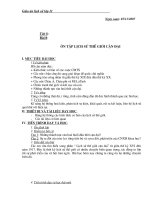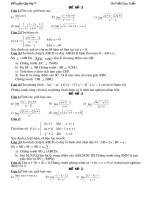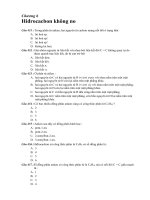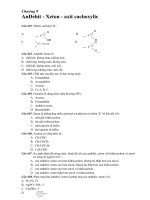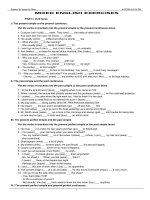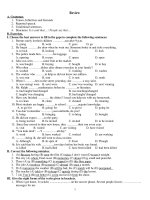Ôn tập lớp 11 lên 12
Bạn đang xem bản rút gọn của tài liệu. Xem và tải ngay bản đầy đủ của tài liệu tại đây (153.8 KB, 10 trang )
Prepared by Nguyen Sy Chien 9/5/2013 20:12:00 a9/p9
Mixed English exercises
PART I: Verb tense
I./ The present simple or the present continous.
Put the verbs in brackets into the present simple or the present continuous tense.
1. Cuckoos (not / build) ___ nests. They (use) ___ the nests of other birds.
2. You can't see Tom now; he (have) ___ a bath.
3. He usually (drink) ___ coffee but today he (drink) ___ tea.
4. - What she (do) ___ in the evening?
- She usually (play) ___ cards or (watch) ___ TV.
5. I won't go out as it (rain) ___ and I (not / have) ___ an umbrella.
6. Ann (make) ___ a dress for herself at the moment. She (make) ___ all her clothes.
7. Hardly anyone (wear) ___ a hat nowadays.
8. - Why you (put) ___ on your coat?
- I (go) ___ for a walk. You (come) ___ with me?
- Yes, I'd love to come. You (mind) ___if I (bring) ___ my dog?
9. - You (write) ___ to him tonight?
- Yes, I always (write) ___ to him on his birthday. You (want) ___ to send any message?
10. - Why you (walk) ___ so fast today? You usually (walk) ___ quite slowly.
- I (hurry) ___ because I (meet) ___ my brother at 4.00 and she (not / like) ___ to be kept waiting.
II./ The past simple and the past continuous.
Put the verbs in brackets into the past simple or the past continuous tense.
1. I lit the fire at 6.00 and it (burn) ___ brightly when Tom came at 7.00.
2. When I arrived, the lecture had already started and the professor (write) ___ on the overhead projector.
3. I (make) ___ the cake when the light went out. I had to finish it in the dark.
4. I didn't want to meet Paul so he entered the room I (leave) ___.
5. My dog (walk) ___ along quietly when Mr. Pitt's Pekinese attacked him.
6. He (clean) ___ his gun and it accidentally (go) ___ off and (kill) ___ him.
7. He (not/ allow) ___ us to go out in the boat yesterday as a strong wind (blow) ___.
8. Mr. Smith never (wake) ___ up in time in the mornings and always (get) ___ into trouble for being late;
so one day he (go) ___ to town and (buy) ___ an alarm clock.
III./ The present perfect simple and the past simple.
Put the verbs in brackets into the present perfect simple or the past simple tense.
1. He (live) ___ in London for two years and then (go) ___ to Edinburgh.
2. - You (wear) ___ your hair long when you were at school?
- Yes, my mother (insist) ___ on it. But when I (leave) ___ school, I (cut) ___ my hair and (wear) ___
short eversince.
3. Shakespeare (write) ___ a lot of plays.
4. My brother (write) ___ several plays. He just (finish) ___ his second tragedy.
5. Chopin (compose) ___ some of his music in Majorca.
6. I can't go out because I (not/ finish) ___ my work.
7. - I (lose) ___ my black gloves. you (see) ___ them anywhere?
- No, I'm afraid, I .... When you last (wear) ___ them?
- I (wear) ___ them at the theatre last night.
- Perhaps you (leave) ___ them at the theatre.
8. I (do) ___ this sort of work when I (be) ___ an apprentice.
9. The concert (begin) ___ at 2.30 and (last) ___ for two hours. Everyone (enjoy) ___ it very much.
10. - Do you know the lady who just (leave) ___ the shop?
- Yes, that's Miss Thriff.
- Is she a customer of yours?
- Not exactly, she (be) ___ here several times but she never (buy) ___ anything.
1
Prepared by Nguyen Sy Chien 9/5/2013 20:12:00 a9/p9
IV./ The present perfect simple and present perfect continuous.
Put the verbs in brackets into the present perfect simple or the present perfect continuous tense. In
some cases either could be used.
1. We (walk) ___ 10 kilometres.
2. - We (walk) ___ for half an hour.
- You (walk) ___ too fast. That's why you are tired.
3. I (make) ___ sausage rolls for the party all the morning.
4. I (sleep) ___ on every bed in this house and I don't like any of them.
5. He (sleep) ___ since 10.00. It's time he woke up.
6. The students (work) ___ very well this term.
7. I only (hear) ___ from him twice since he went away.
8. - I (try) ___ to finish this letter for the last half an hour. I wish you'd go away and stop talking.
- Hardly I (say) ___ anything.
9. I (hope) ___ for the rise in salary for six months but I (not / dare) ___ to ask for it.
10. I (teach) ___ hundreds of students but I never (meet) ___ such hopeless class like this.
V./ The future simple and present continuous.
Put the verbs in brackets into the future simple or the present continuous tense.
1. - I (know) ___ the result in a week.
- You (be) ___ able to drive after another five lessons.
2. If he works well, I (pay) ___ him $10.
3. If you think it over, you (see) ___ that I am right.
4. - Where you (meet) ___ them?
- I (meet) ___ them at midnight in the middle of the wood.
6. - Look! I've broken the teapot. What Mrs. Pitt (say) ___?
- She (not / mind) ___; she has never liked that one.
7. - He has his hair cut too short.
- Don't worry; it (grow) ___ again very quickly.
8. - I am sorry that the child saw the children.
- I don't think it matters. He soon (forget) ___ all about it.
9. He (play) ___ in a tennis match on Friday.
10. She (come) ___ back on Monday.
11. Tom (catch) ___ the 7.40 train.
12. I (move) ___ to a new flat next week.
VI./ The past simple, the past perfect simple and the past perfect continuous.
Put the verbs in brackets into the past simple, the past perfect simple or the past perfect continuous
tense.
He (1.give) ___ me back the book, (2. thank) ___ me for lending it to him and (3. say) ___ that he (4. enjoy) ___ it
very much; but I (5. know) ___ that he (6. not/ read) ___ it because most of the pages were still uncut.
When he (7. see) ___ his wife off the station, he (8. return) ___ home as he (9. not / have) ___ to be at the airport
till 9.30. He (10. not / have) ___ to pack for his wife already (11. do) ___ that for him and his case (12. be) ___ ready in
the hall. He (13. not / have) ___ to check the doors and the windows, either for his wife always (14. do) ___ that before
she (15. leave) ___ the house. All he (16. have) ___ to do (be) ___ to decide whether or not to take his coat with him. In
the end he (17. decide) ___ not to. At 8.30 he (18. pick) ___ up his case, (19. go) ___ out the house and (20. slam) ___
the door behind him. Then he (21. feel) ___ in his pocket for the key, for his wife (22. remind) ___ him to double lock the
front door. When he (23. search) ___ all his popkets and find no key he (24. remember) ___ where it (25. be) ___. He
(26. leave) ___ it in his coat. Then he (27. remember) ___ something esle; his passport and tickets (be) ___ in his coats
as well.
2
Prepared by Nguyen Sy Chien 9/5/2013 20:12:00 a9/p9
PART II: Questions
Make questions of the following would be reasonable answers. Ask about the underlined parts.
Eg: I saw Tom. ⇒ Possible question: Who did you see?
When a noun in brackets is placed after a pronoun, use this noun in the question.
Eg: I saw him (Tom) today. ⇒ Possible question: When did you see Tom?
1. They went to New York. => . . . . . . . . . . . . . . . . . . . . . . . . . . . . . . . . . . . . . .
2. It takes four hours to get there. => . . . . . . . . . . . . . . . . . . . . . . . . . . . . . . . . . . . . . .
3. I didn't think much of it. => . . . . . . . . . . . . . . . . . . . . . . . . . . . . . . . . . . . . . .
4. He earns a hundred pounds a week. => . . . . . . . . . . . . . . . . . . . . . . . . . . . . . . . . . . . . . .
5. He (Tom) was fined $10. => . . . . . . . . . . . . . . . . . . . . . . . . . . . . . . . . . . . . . .
6. My room is twice as big as yours. => . . . . . . . . . . . . . . . . . . . . . . . . . . . . . . . . . . . . . .
7. They left the country 10 years ago. => . . . . . . . . . . . . . . . . . . . . . . . . . . . . . . . . . . . . . .
8. They came by bus. => . . . . . . . . . . . . . . . . . . . . . . . . . . . . . . . . . . . . . .
9. I've been here for two months. => . . . . . . . . . . . . . . . . . . . . . . . . . . . . . . . . . . . . . .
10. They (the students) went to the museum yesterday. => . . . . . . . . . . . . . . . . . . . . . . . . . . . . . . . . . . . . . .
11. He met her in a coffee bar. => . . . . . . . . . . . . . . . . . . . . . . . . . . . . . . . . . . . . . .
12. They (the neighbours) complained about the smell. => . . . . . . . . . . . . . . . . . . . . . . . . . . . . . . . . . . . . . .
13. He (the clerk) made hin fill up the form. => . . . . . . . . . . . . . . . . . . . . . . . . . . . . . . . . . . . . . .
14. The boys ate them (the apples). => . . . . . . . . . . . . . . . . . . . . . . . . . . . . . . . . . . . . . .
15. He got in by climbing over the wall. => . . . . . . . . . . . . . . . . . . . . . . . . . . . . . . . . . . . . . .
16. John bought them (the tickets). => . . . . . . . . . . . . . . . . . . . . . . . . . . . . . . . . . . . . . .
17. They (the roads) were very crowded. => . . . . . . . . . . . . . . . . . . . . . . . . . . . . . . . . . . . . . .
18. I smoke forty cigarettes a day. => . . . . . . . . . . . . . . . . . . . . . . . . . . . . . . . . . . . . . .
19. It (the hotel) was awful. => . . . . . . . . . . . . . . . . . . . . . . . . . . . . . . . . . . . . . .
20. It (the market) is a stone's throw from here. => . . . . . . . . . . . . . . . . . . . . . . . . . . . . . . . . . . . . . .
21. I've had it (this cough) since the beginning of October. => . . . . . . . . . . . . . . . . . . . . . . . . . . . . . . . . . . . . .
22. He (Mr. Brown) tried to blow up the Parliament. => . . . . . . . . . . . . . . . . . . . . . . . . . . . . . . . . . . . . . .
23. I'd like to speak to Mr. Jones, please. => . . . . . . . . . . . . . . . . . . . . . . . . . . . . . . . . . . . . . .
24. This is Tom's. => . . . . . . . . . . . . . . . . . . . . . . . . . . . . . . . . . . . . . .
25. I've been waiting for half an hour. => . . . . . . . . . . . . . . . . . . . . . . . . . . . . . . . . . . . . . .
26. She (Mary) put it in the dustbin. => . . . . . . . . . . . . . . . . . . . . . . . . . . . . . . . . . . . . . .
27. I threw it away because I was tired of it. => . . . . . . . . . . . . . . . . . . . . . . . . . . . . . . . . . . . . . .
28. There are four hotels in the town. => . . . . . . . . . . . . . . . . . . . . . . . . . . . . . . . . . . . . . .
29. They left it (the lawn mower) outside. => . . . . . . . . . . . . . . . . . . . . . . . . . . . . . . . . . . . . . .
30. I found her address by calling at every house in the village. => . . . . . . . . . . . . . . . . . . . . . . . . . . . . . . . . .
PART III: Mixed English exercises
I. Choose the best option to complete the following sentences.
1. I am not interested ___ what you want or what you think. (on / in / at)
2. Do you mind living ___ your own? (on / in / at)
3. John is fond ___ watching TV. (of / in / with)
4. Mary is fed up ___ doing the same thing every day. (about / in / with)
5. What are you listening ___? (in / to / at)
6. We might have a picnic. It depends ___ the weather. (in / at / on)
7. The distance ___ Ha Noi ___ Hai Phong ia about 102 kilometres. (to – from / from – to / in - to)
8. May I take this book ___ your shelf? I'll bring it ___ tomorrow. (from – back / in – back / from - to)
9. I am starving. I ___ have anything to eat last night. (didn't / don't / hadn't)
10. One of the worst diseases ___ mankind has ever had is AIDS. (what / that / which)
11. This is the house ___ Shakespeare was born. (where / who / when)
12. James Watt was a Scottish scientist ___ invention of the Steam Engine is famous throughout the world. (who / that /
whose)
13. You won't pass the exams ___ you work hard. (if / as / unless)
14. My homework is full ___ mistakes. (of / with / over)
15. We are leaving Ha Noi ___ Ho Chi Minh City ___ 2.00 this afternoon. (to - at / for - at / from - at)
3
Prepared by Nguyen Sy Chien 9/5/2013 20:12:00 a9/p9
II. Put in the correct tense of each verb in brackets.
Albert Maltz was a progressive American writer. He (1. be) ___ born in 1908. He (2. write) ___ his first play "Peace
on Earth" in 1943. It was against wars, so the American police (3. arrested) ___ him and (4. put) ___ in prison in 1950.
Dennis Heal is a politician. He (5. go) ___ to Oxford University in 1950 and (6. become) ___ a member of
Parliament for the Labour Party in 1957. He (7. be) ___ an MP since then. He (8. write) ___ three story books including
his autobiography. He is married to artist Adna Heal, and they (9. have) ___ two children. They (10. live) ___ in Oxford
for 15 years, then (11. move) ___ to London in 1970. They now (12. live) ___ in Cadogan Square in central London.
Dear Jill,
Here I am in New York! I (13. be) ___ here for 2 weeks now and it (14. be) ___ very interesting. My friend Nancy,
who I (15. meet) ___ in London in 1982 (16. live) ___ in New York for three years, so she (17. know) ___ all about it.
Yesterday we (18. go) ___ to the city centre and (19. eat) ___ hotdog there. We (20. visit) ___ the Statue of Liberty
this Sunday.
Back on 19
th
.
Love,
Bob
Dinosaurs lived on earth for 175 million years. During this time, species of dinosaurs (21. evolve) ___ and
becoming extinct. Sixty five million years ago the remaining dinosaurs died out.
Some scientists (22. think) ___ that a cooling of the climate caused this extinction. Others believe that the
replacement of one type of plant with other types (23. contribute) ___ to the dinosaurs' decline.
Now, however, evidence (24. suggest) ___ a large meteorite hit the earth and (25. kill) ___ not only the dinosaurs
but also many other animals. Species of plants became extinct as well. After the earth's collision with the meteorite, large
clouds of dust would have thrown into the air. Many animals may not have been able to breathe or adapt to this change
in climate, and they (26. die) ___ as a result.
When I (27. open) ___ the door, I saw a man on his knees. He clearly (28. listen) ___ to our conversation and I (29.
wonder) ___ how much he (30. hear) ___. When I (31. ask) ___ him what he (32. do) ___, he said that he (33. drop) ___
a 50-p-piece outside the door and (34. look) ___ for it.
Mary (35. have) ___ to go to New York last week, but she almost (36. miss) ___ the plane. She (37. stand) ___ in
the cheque at the check-in-desk when she suddenly (38. realize) ___ that she (39. leave) ___ her passport at home.
Fortunately, she (not/ live) ___ very far from the airport so she (41. have) ___ time to go home to get the passport. She
(42. get) ___ back to the airport just in time for her flight.
III./ Fill in the space with the right form of the words in CAPITAL.
1. OLD Oxford is the ___ university in England.
2. GOOD Lan is at ___ cooking than I am.
3. MATHEMATICS/Newton was not only a physicist but also a ___.
4. BORING Don't go to see that play. It is very ___.
5. BAD One of the ___ diseases that mankind has ever had is AIDS.
6. USE What would happen if rare and ___ animals became exrinct.
7. MYSTERIOUS How the ancient Egyptians moved and lifted huge blocks of stone remains a ___.
8. SLOW Can you drive a bit ___, please?
9. CARE You must be ___ when you open the door.
10. DEVELOP The industrial ___ will lead to the prosperity of the country.
11. SAIL Her uncle is a ___ on that ship.
12. EAT It is difficult for Western people to get used to ___ with chopsticks.
13. PEACE The village is very quiet and ___.
14. BE American women are used to ___ independent.
15. INVENT Edison was a famous American ___.
16. WIDE English is the most ___ used language in the world.
17. CARE He cycled ___ and had an accident.
18. EMPLOY The government has promised to deal with the problem of among young people.
19. DRIVE I am not used to ___ on the left.
20. IMPORTANT Preserving natural resources is of great ___.
21. WRITE He makes too many mistakes in his ___.
22. TREE No tree can grow on that soil. It is ___.
4
Prepared by Nguyen Sy Chien 9/5/2013 20:12:00 a9/p9
23. BEAUTY Julia sings ___ more than Susan does.
24. SUCCESS Do not give up because of failure. If you work hard, you'll eventually ___.
25. POSSESS It is unreasonable to regard any language as the ___ of a particular nation.
26. ATTRACT The ___ of the moon for the earth caused the tide.
27. REASON I think that the prices here are ___.
28. EXPECT He's a young man with great ___.
29. DISAPPOINT They were ___ when they read the result.
30. APPLY "What kind of job qualifications do you have?" the manager asked the ___.
IV./ Complete the following sentences in a suitable way.
1. I am fed up with . . . . . . . . . . . . . . . . . . . . . . . . . . . . . . . . . . . . . . . . . . . . . . . . . . . .
2. If we come late . . . . . . . . . . . . . . . . . . . . . . . . . . . . . . . . . . . . . . . . . . . . . . . . . . . . .
3. A footballer is a person . . . . . . . . . . . . . . . . . . . . . . . . . . . . . . . . . . . . . . . . . . . . . . .
4. That's the school where . . . . . . . . . . . . . . . . . . . . . . . . . . . . . . . . . . . . . . . . . . . . . . .
5. They are looking for the bag . . . . . . . . . . . . . . . . . . . . . . . . . . . . . . . . . . . . . . . . . . .
6. They would come if . . . . . . . . . . . . . . . . . . . . . . . . . . . . . . . . . . . . . . . . . . . . . . . . . .
7. He is the one who . . . . . . . . . . . . . . . . . . . . . . . . . . . . . . . . . . . . . . . . . . . . . . . . . . . .
8. It is in Ha Noi, Where . . . . . . . . . . . . . . . . . . . . . . . . . . . . . . . . . . . . . . . . . . . . . . . . .
9. We'll come and see you on Sunday . . . . . . . . . . . . . . . . . . . . . . . . . . . . . . . . . . . . . . .
10. If they knew him, they . . . . . . . . . . . . . . . . . . . . . . . . . . . . . . . . . . . . . . . . . . . . . . . .
11. She lost the book which . . . . . . . . . . . . . . . . . . . . . . . . . . . . . . . . . . . . . . . . . . . . . . .
12. We're trying to find out the reason why . . . . . . . . . . . . . . . . . . . . . . . . . . . . . . . . . .
13. If they were younger . . . . . . . . . . . . . . . . . . . . . . . . . . . . . . . . . . . . . . . . . . . . . . . . . .
14. What will you do as soon as you . . . . . . . . . . . . . . . . . . . . . . . . . . . . . . . . . . . . . . . . ?
15. She had written three novels before she . . . . . . . . . . . . . . . . . . . . . . . . . . . . . . . . . . .
16. He set off for another journey as soon as he . . . . . . . . . . . . . . . . . . . . . . . . . . . . . . . .
17. She left after the . . . . . . . . . . . . . . . . . . . . . . . . . . . . . . . . . . . . . . . . . . . . . . . . . . . . .
28. I'll give you my phone number so that . . . . . . . . . . . . . . . . . . . . . . . . . . . . . . . . . . . .
29. What were you doing when . . . . . . . . . . . . . . . . . . . . . . . . . . . . . . . . . . . . . . . . . . . .
20. I would have bought a new house . . . . . . . . . . . . . . . . . . . . . . . . . . . . . . . . . . . . . . .
21. They asked if . . . . . . . . . . . . . . . . . . . . . . . . . . . . . . . . . . . . . . . . . . . . . . . . . . . . . . .
22. We are not used to . . . . . . . . . . . . . . . . . . . . . . . . . . . . . . . . . . . . . . . . . . . . . . . . . . .
23. Our life is much better than it . . . . . . . . . . . . . . . . . . . . . . . . . . . . . . . . . . . . . . . . . .
24. . . . . . . . . . . . . . . . . . . . . . . . . . . . . . . . . . . . . . . . . . . . . . . . . . since we were at school.
25. They used to . . . . . . . . . . . . . . . . . . . . . . . . . . . . . . . . . . . . . . . . . . . . . . . . . . . . . . ..
26. I don't mind . . . . . . . . . . . . . . . . . . . . . . . . . . . . . . . . . . . . . . . . . . . . . . . . . . . . . . . .
27. If you go to university . . . . . . . . . . . . . . . . . . . . . . . . . . . . . . . . . . . . . . . . . . . . . . . .
28. A biologist is a person who . . . . . . . . . . . . . . . . . . . . . . . . . . . . . . . . . . . . . . . . . . . .
29. A chemist is a person who . . . . . . . . . . . . . . . . . . . . . . . . . . . . . . . . . . . . . . . . . . . . .
30. Is a physicist . . . . . . . . . . . . . . . . . . . . . . . . . . . . . . . . . . . . . . . . . . . . . . . . . . . . . . . .?
PART IV: Reading comprehension
Passage I: Read the following passage, then use the suggested words after the passage to make the questions
and answer the questions you have made.
The English poet and playwright (writer of plays), William Shakespeare is often described as the greatest writer in
the English literature. Shakespeare was born in Stratford Upon-Avon on April 23th, 1564. He was the oldest son of a
wealthy glove maker and wood merchant. Little is known about his childhood, but he probably attended the local
grammar school. In 1582 he married Anne Hathaway, and they had three children. In 1588 Shakespeare moved to
London and joined a leading theatre company called the Chamberlain's men. He quickly established a reputation as a
writer of plays for the comapny and appeared in his own dramas at the Globe Theatre. He also wrote many poems, the
best-known of which are the "Sonets", a series of love poems addressed to an unknown man and a dark lady. The
poems are famous for their beautiful language and strong emotions. Shakespeare returned to Stratford Upon-Avon in
1613 and died there in 1616.
1. Who / Shakespeare? 2. Where / born?
3. When / born? 4. What / do / 1582?
5. What / do / 1588? 6. What / best-known poems?
7. When / return / Stratford Upon-Avon? 8. When / die?
Passage II: Read the following passage, then use the suggested words after the passage to make the questions
and answer the questions you have made.
5


